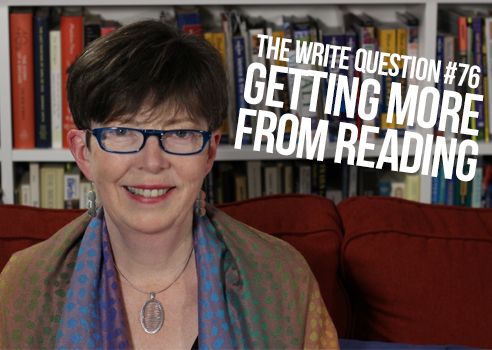Viewing time: 5 mins. 3 secs.
The Write Question is a weekly video podcast all about writing. Today’s question focuses on how writers can get more from their reading. If you have a question you’d like me to answer you can email me at daphne@publicationcoach.com, tweet me @pubcoach, or leave a message for me at the Skype account, The Write Question.
Transcript:
Welcome to The Write Question, I’m Daphne Gray-Grant and my topic today is how writers can get more from their reading.
I have a question from Lela Djakovic a writer from Menlo Park, California. Here’s what’s she’s asked.
[recording] “How do I best read as a writer and related to that what do I read as a writer. I have a notebook where I write down interesting sentences, words, metaphors that I find as I read. I would love to know what other practices I might adopt to improve my writing skills through reading and what reading filters I might apply beyond pure enjoyment and learning something new that will strengthen my writing. I’m also very curious about your all-time favourite books, texts or authors that have influenced you in some meaningful way.”
Thanks for your question, Lela. When people ask me how they can become better writers, I usually suggest that they read more. Many of them look at me in surprise — as if to say, ‘Really?’ “It’s that easy?’
But there’s nothing particularly easy about reading for writing. It’s not something you do for relaxation or entertainment — although of course, you may discover great books through casual reading. But once you’ve decided you want to LEARN from a particular book, then you need to read it as if you were going to write an exam on it.
When I read a Joan Didion book — it was either The Year of Magical Thinking or Blue Nights, links below — I remember her describing how her late husband, John Gregory Dunne, had discovered a book he liked (I think it was Sophie’s Choice by William Styrone. Link below). She described how he read it, over and over again, pacing by the poolside of their California home, trying to understand and absorb Styrone’s writing techniques.
Reading a book more than once and looking specifically for the writerly choices that author has made are both important strategies for the kind of study any author should do.
I like the way you’re keeping a list of interesting sentences, words and metaphors — that’s a really great project. Keep on doing it!
Here’s another trick you might want to try: I like to copy the work of writers I admire. By that I mean type it out, word for word. I’ve copied books (Spunk and Bite by Art Plotnik, link below, was a favourite of mine) and I’ve also copied newspaper or magazine articles. The New York Times and the New Yorker have given me many excellent articles. I copy by typing because my own handwriting is so hard to read but if you prefer to copy by hand, that’s fine as well. I suggest spending a small amount of time on this project — perhaps five minutes — but do it daily.
And here’s the important part — the advice that makes this copying tip extra-worthwhile: AFTER you’ve finished copying a piece or a chapter or some unit of the material, then make the time to read it again, looking specifically for what you can learn as a writer.
You may be surprised to see all the new learnings that occur to you after you’ve taken the time to copy.
I’ve written a blog post on the art of becoming a copycat and I include that link below.
In terms of my own reading, I have particular affection for memoir and one I especially enjoyed this year is called Educated, by Tara Westover. Her story is fascinating but it’s her writing that really captivated me. Link below. I read both fiction and non, but as a non-fiction writer myself, I’m most interested by what I can learn from similar writers. One who has a lot to teach me is Charles Duhigg, author of one of my all-time favourite books,The Power of Habit. Link below. What I like about his writing is the way he is able to incorporate detailed story-telling into what might otherwise be dry scientific reporting.
I’m afraid I can’t give you a list of great authors you should read because such lists are necessarily quirky and individual. Reading is about taste and everyone’s taste is unique. Trust your own judgement and emulate the writers you admire.
Finally, let me wrap up with a quote from the American abolitionist Frederick Douglass, who himself escaped from slavery. “Once you learn to read, you will be forever free.”
Thanks for the question, Lela. I know Douglass was speaking specifically about literacy as it relates to slavery. But I also think his words resonate for all of us. Reading allows us to travel wherever we want and to think freely and widely. It’s an incredible gift and I’m glad you’re able to use it to inspire your own writing.
An earlier version of this post first appeared on my blog on Dec. 7/18.
Links:
The Year of Magical Thinking by Joan Didion
Blue Nights by Joan Didion
Sophie’s Choice by William Styrone
Spunk & Bite by Arthur Plotnik
Why you should be a copycat (blog post)
Educated by Tara Westover
The Power of Habit by Charles Duhigg


